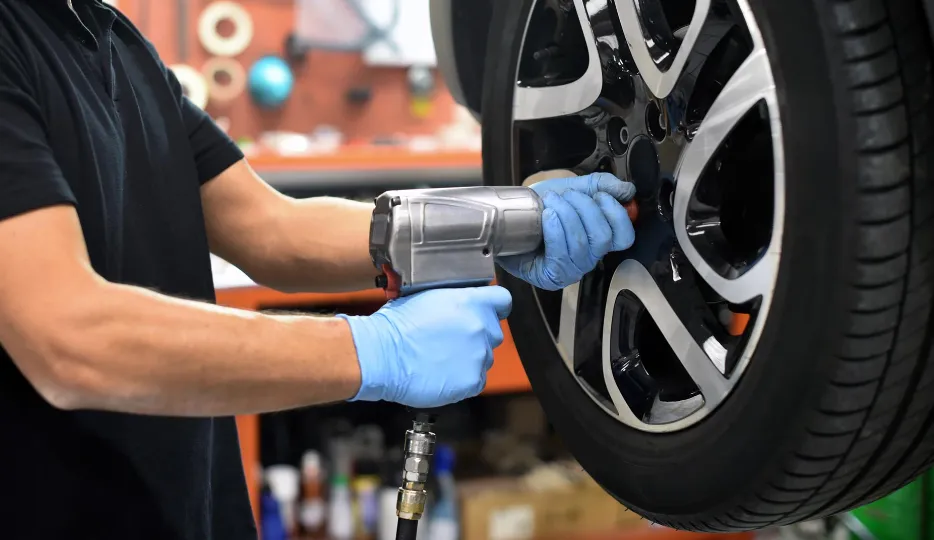Owning a car is more than just driving—it’s about maintenance that keeps your vehicle in top shape. Among the myriad of tasks needed to keep a car running smoothly, tire rotations and oil changes stand out as crucial yet straightforward actions. Whether you’re a car enthusiast, an auto shop owner, or a car owner looking to extend the life of your vehicle, understanding these maintenance tasks can save you time, money, and a headache down the road.
Contents
What is Tire Rotation?
Tire rotation involves changing the position of each tire on your vehicle. This practice ensures that all tires wear evenly, extending their lifespan and improving performance. Regular tire rotations can prevent uneven wear, which often leads to decreased fuel efficiency and poor handling.
Why It Matters
Rotating your tires regularly ensures that each tire wears at the same rate. When tires wear unevenly, it can cause your car to pull to one side, leading to uneven stress on the suspension system. This uneven wear can also reduce fuel efficiency, as your engine has to work harder to compensate for the imbalance.
How Often Should You Rotate Your Tires?
Experts recommend rotating your tires every 5,000 to 8,000 miles. However, it’s essential to consult your vehicle’s owner manual, as recommendations can vary between manufacturers. Some cars are equipped with sensors that alert you when it’s time for a rotation, making it easier to keep track of maintenance.
The Benefits of Regular Tire Rotation
Regular tire rotations can extend the life of your tires, improve gas mileage, and give you a smoother ride. Additionally, it can help you spot potential problems before they become serious, such as misalignment or suspension issues. By catching these early, you can save on costly repairs.
The Importance of Oil Changes
Just like tire rotations, oil changes are vital for maintaining your car’s health. Oil lubricates the engine’s moving parts, reducing friction and preventing overheating. Over time, oil can become dirty and lose its effectiveness, which is why regular oil changes are essential.
Why Oil Changes Are Crucial
Oil changes ensure that your engine runs smoothly. Dirty oil can cause your engine to work harder, leading to increased wear and tear, reduced performance, and, ultimately, engine failure. Regular oil changes keep your car’s engine clean, efficient, and long-lasting.
How Often Should You Change Your Oil?
The frequency of oil changes depends on several factors, including the type of oil used and your driving habits. Generally, it’s recommended to change your oil every 3,000 to 5,000 miles. However, synthetic oils can last longer, sometimes up to 10,000 miles. Always check your owner’s manual for the manufacturer’s recommendations.
The Benefits of Regular Oil Changes
Regular oil changes can significantly improve your car’s performance and longevity. Clean oil reduces friction, ensuring that your engine runs more efficiently. It also helps in preventing sludge buildup, which can lead to engine damage and reduced fuel economy.
Combining Tire Rotations and Oil Changes for Optimal Performance
Combining regular tire rotations and oil changes is a surefire way to keep your car running smoothly. Both tasks are relatively simple but have a significant impact on your vehicle’s health.
Scheduling Maintenance Together
Scheduling tire rotations and oil changes together can be convenient and cost-effective. Many auto shops offer package deals that include both services, saving you time and money. Plus, it allows for a comprehensive checkup, ensuring that your car is in top condition.
The Long-Term Benefits
By consistently rotating your tires and changing your oil, you can avoid more significant issues down the line. These regular maintenance tasks can prevent costly repairs, improve fuel efficiency, and extend the life of your vehicle. It’s a small investment that pays off in the long run.
Trusting the Experts
While some car owners prefer to perform these tasks themselves, trusting professionals can ensure the job is done correctly. Auto shops have the tools and expertise needed to catch potential problems early. For example, if your check engine light diagnosis in Kapolei, HI, reveals an issue, it’s best to have a professional handle it to ensure your car remains in optimal condition.
Understanding the Costs
Maintaining your vehicle does come with costs, but they are minimal compared to the potential expenses of significant repairs. Investing in regular tire rotations and oil changes is a smart move for any car owner.
The Cost of Tire Rotations
Tire rotations are relatively inexpensive, typically ranging from $20 to $50. Many tire shops offer free rotations with the purchase of new tires, adding even more value to your investment.
The Cost of Oil Changes
Oil changes can vary in price depending on the type of oil used and the service provider. Conventional oil changes usually cost between $25 and $55, while synthetic oil changes range from $45 to $75. Despite the higher cost, synthetic oil offers better performance and longevity.
Weighing the Costs vs. Benefits
While the costs of these maintenance tasks can add up, the benefits far outweigh the expenses. Regular tire rotations and oil changes can prevent larger, more costly issues, saving you money in the long term.
The Role of DIY Maintenance
For those who enjoy working on their cars, DIY maintenance can be a rewarding and cost-effective option. However, it’s essential to know when to tackle a job yourself and when to seek professional help.
DIY Tire Rotations
Rotating your tires at home requires basic tools, such as a jack and lug wrench. While it can save you money, it’s crucial to follow proper procedures to ensure your safety and the effectiveness of the rotation.
DIY Oil Changes
Changing your oil at home can also save you money and give you a sense of accomplishment. You’ll need tools such as an oil filter wrench, a drain pan, and a funnel. Make sure to dispose of the used oil properly, as it’s hazardous to the environment.
Knowing Your Limits
While DIY maintenance can be cost-effective, it’s essential to recognize your limits. Some tasks are better left to professionals who have the expertise and equipment to do the job correctly.
Conclusion
Maintaining your vehicle through regular tire rotations and oil changes is essential for keeping it running smoothly. These simple yet impactful tasks can extend the life of your car, improve its performance, and save you money in the long run.
Whether you choose to perform these tasks yourself or trust a professional, the key is consistency. Don’t wait until you have a problem—regular maintenance is the best way to ensure your car stays in top condition. Ready to take the next step? Learn more about maintaining your vehicle and schedule your next service today.









